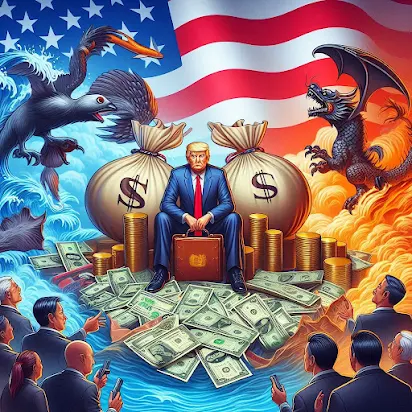The U.S. economy is entering a phase of deep uncertainty, triggered by the revival and expansion of tariffs under the bold new "Liberation Day" trade policy. This major shift in U.S. trade strategy has rocked global markets, weakened consumer confidence, and increased financial pressure on American households.
Tariffs are affecting everyone—from consumers and businesses to workers—creating ripple effects across the economic landscape.
🏛️ A New Era of Trade Wars and Domestic Strain
These newly imposed tariffs are taxes on imports designed to protect domestic industries. But instead of shielding the economy, they are raising costs for companies that rely on foreign materials and passing those costs onto everyday Americans.
American families now pay more for essential items like:
🛒 Electronics
🛒 Groceries
🛒 Clothing
This is causing a spike in living expenses and contributing to rising inflation across the board.
💼 Small Businesses Feel the Squeeze
Small businesses, which often operate with tight budgets, are among the hardest hit. Without large cash reserves, they struggle to absorb the rising prices of imported goods and raw materials.
A local manufacturer using imported steel now pays 30% more, which could lead to:
📉 Reduced production
📉 Job cuts
📉 Even closure
This not only hurts local economies but also increases the national unemployment rate.
🌾 American Farmers Hit by Retaliation
While city-based businesses struggle with rising costs, rural America is facing a different battle. In response to U.S. tariffs, other countries have imposed retaliatory tariffs on U.S. farm exports.
Key agricultural products like:
🌽 Corn
🥛 Dairy
🌱 Soybeans
...are facing export restrictions, causing surplus, falling prices, and major profit losses for farmers. Even with government subsidies, many are on the brink of collapse.
📉 Market Confidence Drops
Investors are also reacting to the unpredictable trade environment. The stock market is seeing increased volatility, with businesses lowering earnings forecasts and delaying expansion plans.
Analysts are warning of a dangerous economic condition called stagflation—a combination of slow growth and high inflation that can paralyze an economy.
🌍 Global Relationships Are Fraying
The tariffs have also affected America’s global standing. Long-time allies and trading partners are frustrated with the unpredictability of U.S. trade policies.
This could mean:
🌐 Broken trade agreements
🌐 Limited access to global markets
🌐 Disrupted supply chains
Such actions risk isolating the U.S. from the very networks that have powered decades of economic growth.
🛠️ How Can Americans Fight Back?
Even with all these challenges, there are ways to protect the economy and support household budgets.
🏘️ Support Local: Buy from local businesses and choose American-made products whenever possible.
📊 Policy Matters: Lawmakers should introduce relief programs, invest in U.S. manufacturing, and negotiate smarter trade deals.
📚 Knowledge Is Economic Power
Public awareness can be a game changer. When people understand how trade policies affect their daily lives, they can:
💡 Make smarter financial choices
💡 Adjust spending habits
💡 Advocate for change
Educational outreach and financial literacy programs can empower Americans during economic uncertainty.
🧭 Final Thoughts: Choose Action Over Fear
Tariff-driven trade policy has far-reaching impacts, but with clear strategies, informed leadership, and public cooperation, America can weather the storm.
The key lies in:
✅ Supporting domestic innovation
✅ Strengthening community economies
✅ Building balanced trade relationships






0 Comments